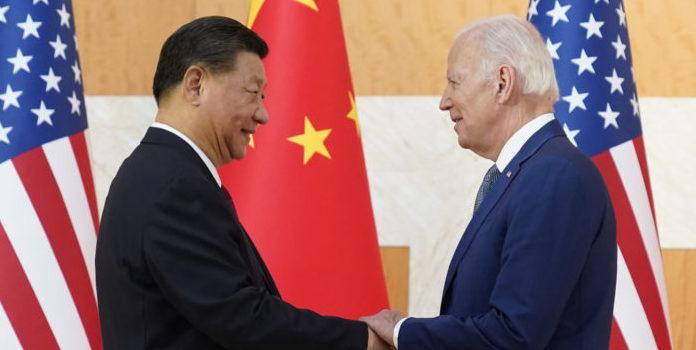(House Committee on Oversight and Accountability Chairman James Comer, R-Ky., sent nine letters to federal agencies Thursday saying China has infiltrated the U.S. economy and government and needs to be uprooted.
There have been several high-profile examples of Chinese spying and infiltration success, from the Chinese spy balloon that covered the country from coast to coast last year to ongoing cyber attacks to the significant purchase of U.S. farmland by China, including near U.S. military installations.
“Without firing a single bullet, the Chinese Communist Party is waging war against the U.S. by targeting, influencing, and infiltrating every economic sector and community in America,” Comer said.
“We know that this coordinated influence and infiltration campaign by the CCP threatens U.S. military readiness, the technology sector, financial markets, agriculture industry, education systems, and intellectual property,” he added. “The lives and security of all Americans are affected.”
Comer sent letters to the Department of Justice, the U.S. Department of Agriculture, the Environmental Protection Agency, the Drug Enforcement Administration, United States Agency for Global Media, the Treasury Department’s Financial Crimes Enforcement Network, the National Aeronautics and Space Administration, the Federal Energy Regulatory Commission, and the National Science Foundation.
He demanded answers about how Chinese Communist Party actors may be infiltrating and taking advantage of their respective organizations and what is being done to stop it.
“The Committee is conducting oversight of the federal government’s work to protect the American people from CCP ‘political warfare’ and nefarious influence operations,” Comer said.
FBI Director Christopher Wray testified last month before Congress that the People’s Republic of China’s cyber attacks were a serious danger.
“But the PRC’s cyber onslaught goes way beyond prepositioning for future conflict,” he said. “Today, and literally every day, they’re actively attacking our economic security—engaging in wholesale theft of our innovation and our personal and corporate data.”
Although hostile nations traditionally do not maintain trade and diplomatic relations, one thing that makes the threat of China particularly pernicious is that it has interwoven itself into every fiber of the American economy and, at face value, appear to be working toward mutually beneficial objectives while behind the scenes they are working to undermine the very system they contribute to.
“The PRC cyber threat is made vastly more dangerous by the way they knit cyber into a whole-of-government campaign against us,” Wray said. “They recruit human sources to target our businesses, using insiders to steal the same kinds of innovation and data their hackers are targeting while also engaging in corporate deception—hiding Beijing’s hand in transactions, joint ventures, and investments—to do the same.”
Comer suggested there would be more action on the issue on the horizon.
“The Oversight Committee has a responsibility to ensure the federal government is taking every action necessary to protect Americans from the CCP’s ongoing political warfare,” Comer said. “Actions taken by the Committee today are just the beginning and I look forward to full cooperation from agencies as we work to thwart China’s efforts to influence and infiltrate the United States of America.”
The nonprofit organization State Armor conducted a poll with Marist that found Americans were concerned about China’s influence with “80% of Americans support or strongly support legislation that requires American companies to remove Chinese telecommunications equipment.”
The survey also reported that 79% of Americans “support or strongly support legislation that blocks foreign companies [such as China] from bidding on state or local contracts for projects or supplies.”
The issue has come front and center in a congressional debate over whether to ban the China-based app TikTok, with the House having overwhelmingly passed a bipartisan bill to divest in its parent company, Bytedance.
Former President Donald Trump, who previously backed the ban, reversed his position after meeting with donor Jeff Yass, while also making the case that a TikTok ban would benefit the equally pernicious U.S. company Facebook.
But many Trump supporters disagree, arguing that China is systematically mining data and keystrokes from TikTok users.

